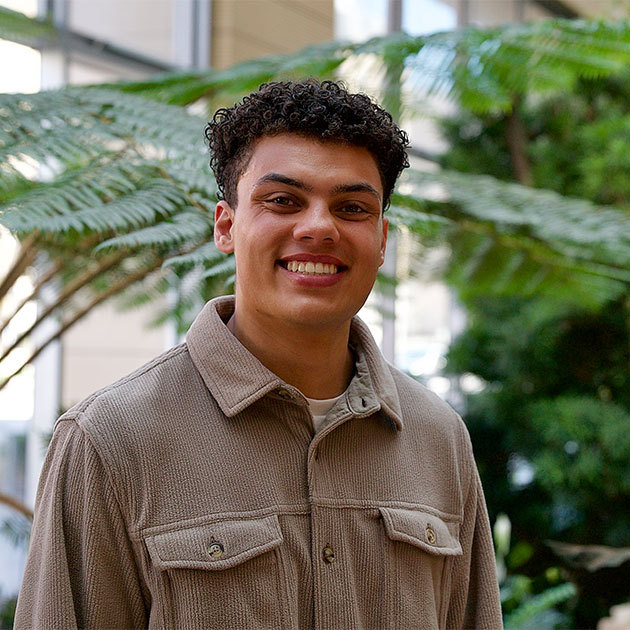Max Koenig, from Baraboo, will follow his May 2024 graduation with a year-long exploration of the influence of African culture, history and music in communities that were impacted by slavery. His travels will take him to Caribbean nations, Colombia and Brazil.

Koenig was awarded the College of Letters & Science Wolff Fellowship, which was created by Paul Martin Wolff (’63) and Rhea S. Schwartz. Now in its third year, the $45,000 fellowship annually awards an L&S senior the chance to design their own international and interdisciplinary experience. Koenig is using this once-in-a-lifetime opportunity to visit the places and communities forged through the African diaspora in the Americas.
Koenig’s long-standing commitment to volunteering with Black youth and communities of color, plus his own family roots in Madagascar, are some of the influences that came together to inspire his fellowship year.
“The intellectual idea that left the biggest mark on me emerged in my African American Studies class on race and racism during my freshman year,” Koenig says. “Professor Mosi Adesina Ifatunji shared a transformative statement by [Jamaican political activist] Marcus Garvey: ‘We are going to emancipate ourselves from mental slavery because whilst others might free the body, none but ourselves can free the mind.’”
Jamaica is one of Koenig’s destinations, and it’s where he plans to explore the Afrocentric Rastafarian religion, especially as celebrated through the music of Bob Marley and other influential Jamaican musicians. Max will also immerse himself in the calypso and soca musical traditions of the Trinidad and Tobago Carnival and take steelpan drum lessons.
Like Jamaica, St. Kitts was a center of slave trading and agriculture. Koenig plans to visit several historic places on St. Kitts and Nevis, including the Brimstone Hill Fortress, which is a UNESCO World Heritage site that preserves British architecture that was built by African enslaved labor. Other key ports of entry for enslaved people and early Black communities on Koenig’s itinerary include Santo Domingo (Dominican Republic), Port of Spain (Trinidad), San Basilio de Palenque (Colombia) and Salvador de Bahia (Brazil).
Education has always been important to Koenig. “Through the Badger Volunteers program, I worked closely with young Black students, offering homework assistance, mentoring and facilitating enriching activities,” Koenig says. “I was deeply grateful for the experience as it opened my eyes to Black spaces and programs, spaces I lacked access to as a child. The transformative effect on my mindset and understanding fueled my desire to continue these experiences.”
In Cabarete, Dominican Republic, he will volunteer for two-and-a-half months at a Montessori elementary school in a region with a high poverty rate. Koenig will also volunteer for two months at a school in Barranquilla, Colombia, that focuses on ethno-education (incorporating the traditions, knowledge and beliefs of local ethnic minorities).
For Koenig, who has an interest in working in the public education system, these teaching experiences will be transformational. He knows first-hand the ways that teachers can change the paths of their students. After studying Spanish in high school, Koenig returned to that language in his third year at UW–Madison where he was inspired by his instructor, Matthew J. Burner, who says, “The challenges that Max has met will bring important perspective to the Afro-Latino population that he plans to work with as he discovers similar trials and tribulations in working directly with them and within their communities. … Serving as a Wolff Fellow will open more doors to higher education, allowing Max to pave his own way while he not only learns more about himself, but also while he continues to find ways to give back and to share his own experiences.”
During his undergraduate years at UW–Madison, Koenig volunteered for WSUM student radio, was a leader in the Wisconsin Wellness club, served as a peer advisor for the Career Exploration Center, conducted research in the Harackiewicz lab and was a Mercile J. Lee Powers-Knapp scholar. Koenig will earn his UW–Madison degree this spring, with a major in psychology and a certificate in African studies.
Originally published in ls.wisc.edu.